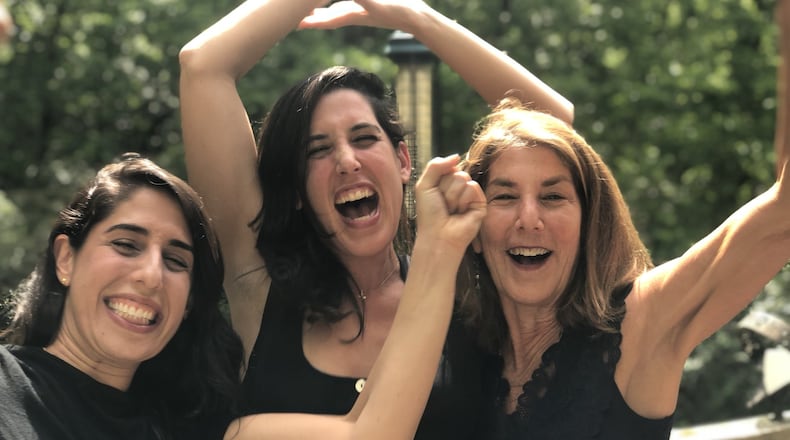What do you do if you’ve just won a Pulitzer Prize?
If you’re Emily Green, you go back to work because you’re a freelance journalist and the gigs are fewer and farther between these days.
So while her colleagues at Chicago Public Media were celebrating, Green, 36, was covering the killing of Brunswick resident Ahmaud Arbery for WABE in Atlanta.
She did, however, reserve a few hours for champagne and celebration. “I think we must have yelled for sheer joy for four hours.”
Helping her yell were her parents, Ralph Green and Amy Totenberg. Emily Green is based in Mexico City, and she won her prize for a “This American Life” episode from November 2019, on the Mexican cartels that kidnap asylum seekers at the U.S. border. But on March 20, as the coronavirus crisis swept the globe, Green’s parents talked her into returning to the U.S. to wait out the pandemic.
Green had just awakened in her childhood bedroom last week, at the East Atlanta house where she grew up, when she found out that she was in contention. “I didn’t know that I was nominated.”
She won in the audio recording category, in the first year that such a category existed. This made the experience even stranger. “I wouldn’t say I dreamed of it — I’m far too realistic for that — but, yeah to win it in the inaugural year makes something that is already surreal and shocking, it just adds to it.”
She shares the prize with Molly O'Toole, of the Los Angeles Times. Her episode, "The Out Crowd," is a wrenching account of a young man and his 11-year-old son, refugees from Honduras, who Green interviews on the bridge between Laredo, Texas, and Nuevo Laredo, Mexico. It is just after the man (she calls him "David") is sent back to Mexico to await an asylum hearing.
He is terrified that he will be kidnapped and is sobbing. Night falls. Green returns to the U.S. side of the border and receives a phone call while she’s at dinner. David and his son have been kidnapped.
Green’s episode contains remarkable material, including recordings of the phone calls that the kidnappers made to David’s sister “Laura,” a resident of New Jersey, demanding $9,000 each, for father and son.
She returned to northern Mexico and met David again in Monterrey after he had been released, getting a first-person account of the kidnapping industry. The captors told him his son’s internal organs would fetch a good price on the open market because they were still young and viable.
It was impossible to report the story without becoming affected, she said, and Green’s emotions are apparent. “As journalists, there is this expectation of the neutral objective observer. But when you are reporting on people in life or death situations, those lines become blurred,” she said.
“When I interviewed (David) on the bridge — I’ve interviewed a lot of people in extremely harrowing situations, but I shed some tears after that interview.”
She was also in danger. The State Department classifies Nuevo Laredo as a level four threat, equivalent to Iraq and Syria. “Los Malos,” the bad guys, wait in brand-new SUVs as each new wave of asylum seekers are herded back across the bridge and sent to the Mexican Immigration office.
“I remember leaving the Mexican Immigration office and one of the men in the SUVs turned and looked at me. We made eye contact, and it scared the living hell out of me.”
Though Green, who attended the Paideia School in Atlanta, has public radio in the bloodlines (her aunt, Nina Totenberg, is a legal affairs correspondent for NPR), Green began her career in print journalism and continues to work in both worlds.
Print offers nuance, she said, but radio (and the podcast) offer immediacy. She had written about the kidnapped father for Vice.com, but in print, she said, “you can’t hear the extortion calls; you can’t hear the father crying; you can’t even hear my own effort to comfort the father.”
Green’s parents speak of their daughter’s career reporting on trouble spots in Mexico and Central America with a mixture of “great pride” and “acute parental anxiety.”
“They have given me some ‘talkings to’ about my trips,” said the daughter.
But she is proud of her work and gratified to be able to pursue it.
"I think what I feel proudest about that reporting is that it made people care, I like to think," she said. "I don't have any illusion that my reporting, or anyone's for that matter, will affect policy, at least under this administration. But I do consider it an act of bearing witness. And we cannot say, years down the road, that we didn't know this was happening, that we didn't know we were sending asylum seekers into the hands of cartels, to be kidnapped and extorted and sometimes killed."
About the Author
Keep Reading
The Latest
Featured





